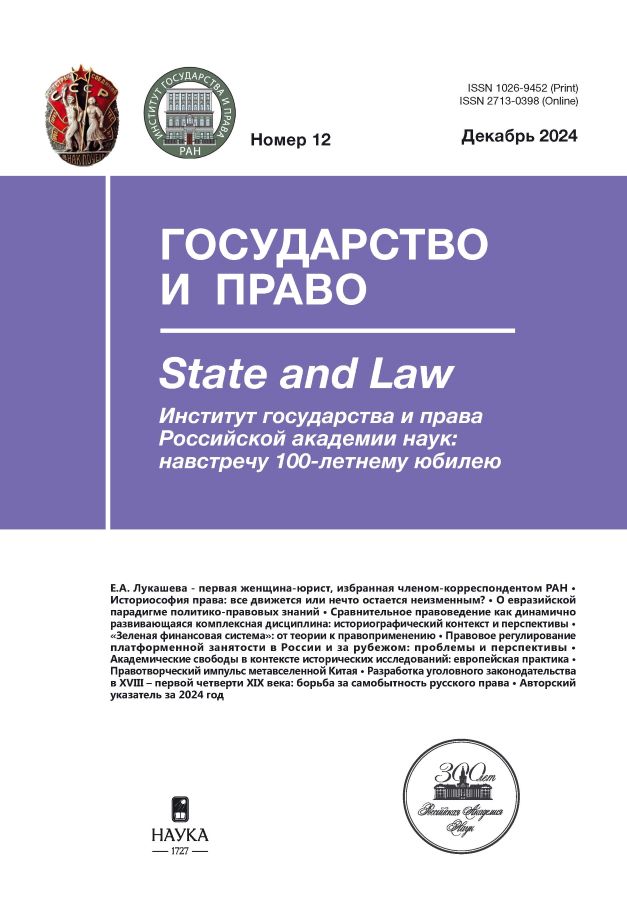Legality and its interpretations in modern political and legal thought
- 作者: Savenkov A.A.1
-
隶属关系:
- Institute of State and Law of the Russian Academy of Sciences
- 期: 编号 12 (2024)
- 页面: 57-64
- 栏目: Legal, political, philosophical and religious thought
- URL: https://vestnik.nvsu.ru/1026-9452/article/view/681488
- DOI: https://doi.org/10.31857/S1026945224120056
- ID: 681488
如何引用文章
详细
The article examines the problems of legality and its various interpretations in the history of modern political and legal thought, following which not only forms approaches to understanding the very meaning of the relevant concept, but also is associated with a number of characteristic assessments of the role and importance of legality in public life, in the field of state-building, protection of human rights and freedoms. Depending on the interpretations of legality, an idea of it develops as a problem not only of a state-practical plan, but also a fundamental legal problem and a topic accompanying the evolution of political and legal thought from ancient times to the present day. Already in the ancient formula of legitimate justice, the requirement of combining law and law, the impossibility of arbitrary content of the law, is read. In the philosophy of law and the theory of law of the last two centuries, the problem of distinguishing and correlating legality and legitimacy has begun to replace traditional dualism in legal science and ideas about types of legal understanding. At the same time, in the logic of legality and legitimacy, the first is defined from the point of view of legal theory, and the second, as if simultaneously, from the position of political science or political sociology. With such a distortion of the principle of identity, disputes and disagreements are not only not solvable, but are also resolved using cognitive and explanatory techniques and means that are different in nature.
全文:
作者简介
Artyom Savenkov
Institute of State and Law of the Russian Academy of Sciences
编辑信件的主要联系方式.
Email: artem.199417@yandex.ru
PhD in Law, Post-Doctoral Student
俄罗斯联邦, 10 Znamenka str., 119019 Moscow参考
- Aleksandrov N. G. Socialist legality – the most important condition for the further strengthening of the Soviet socialist state // Jubilee scientific session dedicated to the 200th anniversary of the University, May 9–13, 1955: abstracts of the Law Faculty. M., 1955. P. 8 (in Russ.).
- Arkhipov K. A. The concept of law (The first chapter from the book „The Law in Soviet law and legality in Soviet governance“) // Soviet law. 1924. No. 2. Pp. 66, 68 (in Russ.).
- Voplenko N. N. Legality and legal order. Volgograd, 2006 (in Russ.).
- Gorban V. S. On the importance and methodological aspects of historiographical studies of political and legal doctrines // State and Law. 2024. No. 8. Pp. 41–54 (in Russ.).
- Iering R. Struggle for the right / transl. S. I. Ershov from the 13th German edition. 2nd ed. M., 1907 (in Russ.).
- Ilyin I. A. On the essence of legal awareness. Munich, 1956 (in Russ.).
- Kovalev V. A. Bourgeois legality: theoretical illusions and judicial-police reality. M., 1986 (in Russ.).
- Lukasheva E. A. The role of legal awareness in socialist society in the light of Comrade Stalin‘s work “Marxism and questions of linguistics” // Scientific conference. graduate students: abstracts of reports”. M., 1952. Pp. 5, 6 (in Russ.).
- Nizhnik N. S., Papyrin V. V. Legality as a socio-legal phenomenon. SPb., 2012 (in Russ.).
- Strogovich M. S. Socialist legality is an unshakable principle of our social life. M., 1969. Pp. 4, 5, 8 (in Russ.).
- Tkachenko V. D. Socialist legality as a multidimensional phenomenon // Issues of state and law of a developed socialist society: abstracts of the Republican Scientific Conference on September 24–26, 1975. Kharkov, 1975. Pp. 25, 26 (in Russ.).
- Khalfina R. O. Socialist legality and regulation of property relations between socialist organizations // Interuniversity scientific conference on the topic “Socialist legality, interpretation and application of Soviet laws (abstracts)”. Kiev, 1961. P. 77 (in Russ.).
- Chkhikvadze V. M. State, democracy, legality. Leninʼs ideas and modernity. M., 1967. P. 377 (in Russ.).
- Shershenevich G. F. On the sense of legality: a public lecture delivered on March 10, 1897. Kazan, 1897. P. 8 (in Russ.).
- Shtammler R. The regularity of the legal order and the national economy / transl. S. N. Zelinskaya. Kiev, 1904. Pp. 3, 4 (in Russ.).
- Habermas J. Wie Ist Legitimität Durch Legalität Möglich? // Kritische Justiz. 1987. Vol. 20. No. 1. S. 5.
- Murphy M. Review of Legality, by S. J. Shapiro // Law and Philosophy. 2011. Vol. 30. No. 3. Pp. 369–375.
- Preuß U. Legalität – Loyalität – Legitimität // Leviathan. 1977. Vol. 5. No. 4. S. 450–466.
- Shapiro S. Legality. Harvard University Press, 2011. Pp. 122–124, 183–188, 213, 225, 226.
- Winckelmann J. Die Verfassungsrechtliche Unterscheidung von Legitimität und Legalität // Zeitschrift Für Die Gesamte Staatswissenschaft=Journal of Institutional and Theoretical Economics. 1956. Vol. 112. No. 1. S. 172, 173.
补充文件









